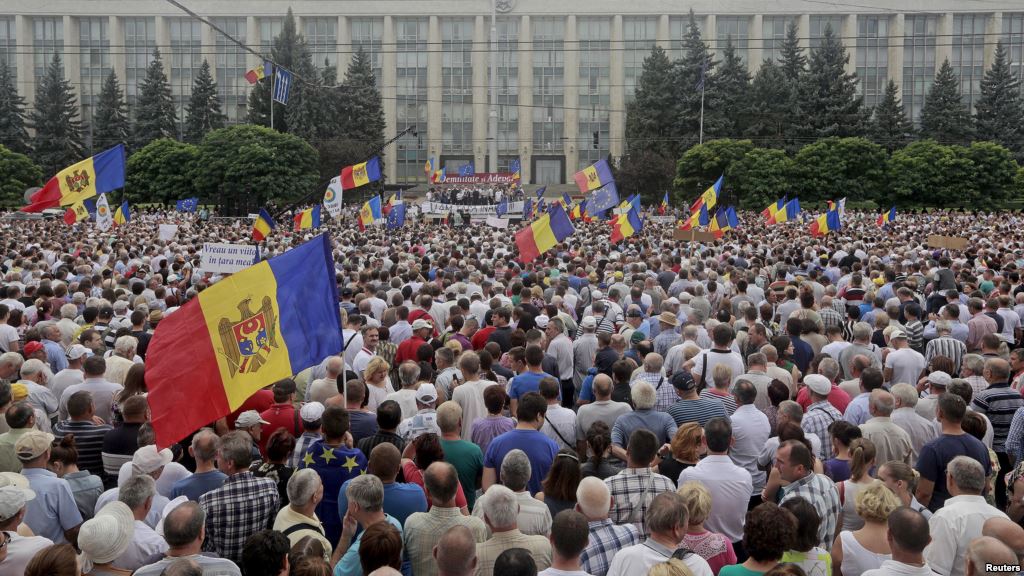
Moldova Ungoverned, Close to State Failure
Publication: Eurasia Daily Monitor Volume: 13 Issue: 6
By:

Literally in the final days of 2015, a new political constellation has emerged on the center-right of Moldova’s party spectrum that might yet open a way out from state failure. But such a rescue, while still possible, requires a certain time for organizational work. For now, Moldova stands at a crossroads with three directions in sight, each of them a shortcut toward some form of state failure: either 1) outright collapse of governance, or 2) takeover (“state capture”) by the financial-political operator Vladimir Plahotniuc, or 3) snap elections, which pro-Russia parties would win against the governing Alliance for European Integration.
Moldova had five governments (five cabinets of ministers under as many prime ministers) during the calendar year 2015. Most of this time the governments held an interim status, lacking authority to initiate legislation or to negotiate with Western partners. The European Union’s Association Agreement with Moldova had been signed in June 2014, but no serious work has been done to implement it to date. For failing to adjust to EU standards, Moldovan agricultural exports to the economic bloc fell far short of the market quotas open to Moldova by the EU-Moldova trade agreement (IPN, January 8).
Plahotniuc and his allies, uninterested in the European agenda, focused on subduing or destroying the Liberal-Democrat Party, the only committed pro-Western party in the nominal coalition government. The Liberal-Democrat prime ministers Chiril Gaburici and Valeriu Strelet were, one after the other, forced out, as were several ministers from that same party. Plahotniuc’s appointees in the law enforcement system orchestrated the unlawful detention of Liberal-Democrat Party leader Vlad Filat. The institutional chaos and the economy’s collapse (see below) boosted the ratings and self-confidence of two upstart pro-Russia parties: Igor Dodon’s Socialists and Renato Usatii’s Our Party. They overtook the senescent Communist Party, are agitating for pre-term elections, and look set to win such elections if these are rushed.
At least $ 1billion, equivalent to 15 percent of Moldova’s annual gross domestic product (GDP), disappeared from the banking system, apparently stolen by anonymous shareholders, with the state authorities’ connivance. The theft necessitated re-capitalization through new state debts at taxpayers’ expense. This triggered chain reactions by depreciating the national currency, raising consumer goods prices and energy tariffs across the board, while the GDP dropped by 2 percent in 2015. Since mid-year, the government has practically been running on empty, without a valid state budget; and no budget is being discussed for 2016. No new foreign investments were made in 2015. Moldova’s exports declined by 16 percent, and imports declined by 25 percent in 2015, compared with 2014 (IPN, January 7, 2016).
The European Union, the International Monetary Fund, the World Bank, and other international lenders and donors have suspended all programs with Moldova, pending clarification of the financial crimes and political situation in the country. Separately from this case, investigations are apparently under way in Russia and the West (not in Moldova) regarding billions of dollars laundered from Russia through Moldovan banks to the West.
Failing governance and political chaos under the “European Integration” label has discredited the governing coalition, its component parties, the parliamentary system of government, and the European Union’s brand in Moldova. Support for the country’s European orientation fell dramatically, being overtaken by ill-informed sympathies for the Russia-led Eurasian Economic Union in the opinion polls. The three “pro-Europe” governing parties dropped to, or below, the 6 percent parliamentary threshold in the polls. Plahotniuc’s party seems nevertheless poised to emerge stronger, thanks to its financial resources and skilful tactical alliances.
Those trends, under way for several years, accelerated in 2015 in the direction of state collapse. Meanwhile the Liberal-Democrats, until 2015 the sole pro-Western party in government, largest pro-Western group in parliament, and strongest political force in the country, has lost its funding as a result of Filat’s arrest. It must now choose either joining the new center-right parties or, alternatively, the breakup and satellization of its remnant in a Plahotniuc-controlled government.
Those new center-right parties can inherit the European agenda in Moldova. Whether Plahotniuc’s own coalition takes over power, or—in the other scenario—pro-Russia parties win pre-term elections, the emerging pro-Western parties will find themselves in the opposition either way, and will have to win elections next time.
Moldova’s pro-Western groups have been looking to the European Union and the United States for clear guidance in this situation; but the Western messages seem couched in generalities, apparently loath to “interfere,” and hesitant to encourage pro-Western forces in ways understandable to them and the public at large. The guidance being awaited is to assist Moldova’s pro-Western parties aiming for pre-term parliamentary elections in the second half of 2016. This advice would be effective only if its dispensed on a timetable that would allow the new center-right parties (see above) to prepare their campaigns. If properly organized and timed, pre-term parliamentary elections would be the only way to forestall those aforementioned three varieties of state failure.




